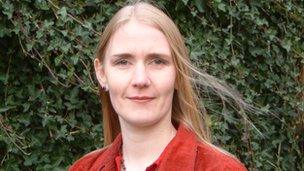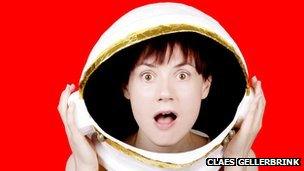Ada Lovelace Day: Women celebrate female scientists
- Published
Four women working in science share their experiences
"If we get to a point where a female physicist is as famous as Cheryl Cole, we'll have sorted out the issue," said Suw Charman-Anderson.
She is the organiser of Ada Lovelace Day, an annual event designed to raise the profile of female scientists, technologists, engineers and mathematicians.
Ada Lovelace Day is on 16 October and in London a cabaret-style evening of talks, demonstrations and singing, all performed by women, will mark the event, with additional celebrations planned in Brazil, Slovenia, Sweden, Italy and the US.
The day is named after Ada Lovelace, who worked with inventor Charles Babbage on plans for an "analytical engine" in the 1800s.

Suw Charman-Anderson started Ada Lovelace Day in 2009
The device is now widely regarded as the world's first computer model, and Ms Lovelace as the first computer programmer, although the pair never actually built it.
Unappealing adverts
"The event is about trying to create great role models," said Ms Charman-Anderson, who started the event in 2009.
"We are trying to get the message out to girls, young women and mid-career women to say, 'You can achieve this and look, here are some awesome women who've done that.'
"We are severely lacking in good strong female role models in these areas."
Performers at the cabaret include technology broadcaster Gia Milinovich, accelerator physicist Dr Suzie Sheehey and science writer Dr Helen Scales.
The Women's Engineering Society (WES) will also use the event to present an award to civil engineer Karen Cooksey, whom it has crowned the "best newly qualified chartered engineer" of the year.
WES was established 95 years ago but currently has fewer than 700 members, said its ambassador, Dawn Bonfield.
A recruitment agency contacted the society recently to ask why it was not receiving any female applicants for its engineering-related job positions.
"A lot of our female members said engineering job adverts don't look appealing to women - they don't have women in the images, they don't mention anything about work-life balance, there doesn't appear to be any flexibility in terms of time," said Ms Bonfield.
"They just put women off somehow."
Skills at school
In 2011 in the UK, one in three working men but only one in 20 working women had a career in science, engineering or technology (SET), wrote Marion Scott from the UK Resource Centre for Women in SET in a blog post, external.
And more new research by the Centre for Economics and Business Research suggested that one in four new jobs in Britain will be in these fields by 2017.
"There is generally a shortfall of people working in technology," said Gia Milinovich.
"The numbers are slowly going up but the issue with technology is there aren't enough men or women going into it."
Ms Milinovich believes children need more encouragement in school from a young age.
"My son's school dropped ICT courses because the universities said they were useless for anyone wanting to do computer science at university," she said.
"We need to get coding back into school. Kids in primary school could be learning how to make websites. Kids should be messing around with an Arduino [a microcontroller] and learning to code in C. When they get the opportunity to do it they get very excited about it."
Mercury 13
Comedian Helen Keen, another performer at the cabaret, wrote and starred in Radio 4 comedy series It Is Rocket Science! She recalled a haphazard approach to science at her own secondary school in the 1980s.

Helen Keen will be talking about a group of women who trained as astronauts in the 1950s
"For biology we had the home economics teacher for a while," she said.
"I wish there had been more awareness of space (industry) careers... but when you're a girl people don't really expect you to be interested in that."
She is planning to tell the story of the Mercury 13 - a group of women in the 1950s and 60s who underwent the same training as male Nasa astronauts preparing for a space mission, in order to demonstrate whether women were as capable as men of doing the job.
Thirteen out of 19 completed the tests but they were never sent into space.
"They were very inspiring women to read about - but ultimately it is quite a tragic story," said Ms Keen.
'Female Brian Cox'
For Suw Charman-Anderson, one of the problems facing women is that society still does not expect them to excel in STEM areas.
"There are societal expectations about what is preferable for women to study or be interested in," she said.
"People say, a female Dr Brian Cox [high-profile physicist and broadcaster] is what you need. I understand what they mean but it's a problematic formulation - you can't create a female Brian Cox.
"We're not trying to emulate men - certainly not specific men - what we want to do is have more women who are known for their expertise."
Ada Lovelace Live! takes place at the Institute of Engineering and Technology from 19:00 BST.
- Published24 September 2012